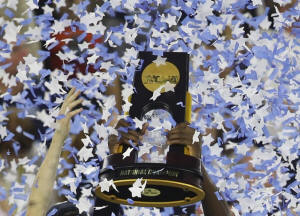|
Loss of 'March Madness' games could hurt
North Carolina governor's re-election bid
 Send a link to a friend
Send a link to a friend
 [September 14, 2016]
By Colleen Jenkins [September 14, 2016]
By Colleen Jenkins
WINSTON-SALEM, N.C. (Reuters) - North
Carolina Governor Pat McCrory has weathered negative headlines as jobs,
conventions and musical performances were canceled in his state this
year to protest a law deemed discriminatory against lesbian, gay,
bisexual and transgender people.
But news that the Southern state was being stripped of hosting two
rounds of the nationally popular "March Madness" Division I men's
college basketball tournament next spring could prove the law's most
damaging fallout yet for the Republican seeking re-election in November,
political experts said on Tuesday.
"Thereís one thing you donít do in North Carolina. That is mess with
basketball, particularly college basketball," said Michael Bitzer, a
political scientist at Catawba College in Salisbury.
In addition to the tournament, the National Collegiate Athletic
Association (NCAA) announced on Monday it would relocate six other
championship sporting events from North Carolina for the 2016-17 season.
NCAA President Mark Emmert said the move was a "proverbial no-brainer"
after North Carolina in March became the only U.S. state to require
transgender people to use bathrooms in government buildings and public
schools that correspond with the sex listed on their birth certificate.
The Republican-backed law, known as House Bill 2 or H.B. 2, also blocked
local government measures aimed at protecting lesbian, gay, bisexual and
transgender people from discrimination.

McCrory signed the measure into law and has continued to defend it as he
campaigns for a second four-year term. Several recent opinion polls show
him trailing his Democratic opponent, state Attorney General Roy Cooper,
who has criticized the incumbent for backing the law despite mounting
economic losses.
In July, the National Basketball Association yanked its 2017 All-Star
Game from Charlotte over objections to H.B. 2.
The NCAA's decision will not help McCrory's re-election chances, said
Steven Greene, a political science professor at North Carolina State
University in Raleigh, the state capital.
"Heís going to suffer from this the most," Greene said in a phone
interview, explaining that most of the Republican state legislators
associated with the law represent districts drawn so that Republicans
have a good chance of winning elections.
[to top of second column] |

View of the NCAA basketball trophy as confetti falls after the game
between the Villanova Wildcats and the North Carolina Tar Heels in
the championship game of the 2016 NCAA Men's Final Four at NRG
Stadium, in Houston, Texas, April 4, 2016. Mandatory Credit: Troy
Taormina-USA TODAY Sports

Responding on Tuesday to the NCAA's move, McCrory called for a halt
to "economic threats or political retaliation" while nearly two
dozen states challenge an Obama administration policy that calls for
public schools to allow transgender students to use the bathrooms of
their choice.
"The issue of redefining gender and basic norms of privacy will be
resolved in the near future in the United States court system for
not only North Carolina, but the entire nation," the governor said
in a statement.
Around North Carolina, residents and local officials bemoaned the
loss of championship events. Polls have shown most voters think the
law is hurting the state, which has hosted more Division I menís
basketball tournament games than any other.
"That's part of North Carolina's heart right there," said Cindy
Clodfelter, 62, a retired school counselor in Winston-Salem.
"Anything that messes with my sports, I don't like it."
The mayor of Cary - a town which was to host championship events in
women's soccer, men's and women's tennis, women's lacrosse and
baseball, but lost all of them to this week's NCAA decision - said
it was time for state lawmakers to re-evaluate the law.
McCrory "seems to be doubling down," said Mayor Harold Weinbrecht
Jr. "It will say a lot about our state if he wins or if he loses."
(Reporting by Colleen Jenkins; Editing by Will Dunham and Jonathan
Oatis)
[© 2016 Thomson Reuters. All rights
reserved.]
Copyright 2016 Reuters. All rights reserved. This material may not be published,
broadcast, rewritten or redistributed.
 |